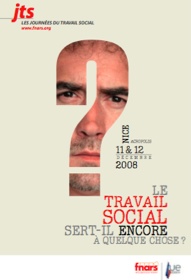The FNARS is organizing “The Social Work Days” in Nice on December 11 and 12, 2008.
“… Our society is marked by significant social and economic changes that profoundly alter the missions of social work. The forms of exclusion are multiplying, social workers face increasingly diverse demands concerning housing difficulties, employment, education, family fragmentation, over-indebtedness, or the reception of foreigners…” Nicole Maestracci, President of the FNARS (National Federation of Reception and Social Reintegration Associations).
2 days to contribute to the debate
The FNARS advocates for a society that gives a place to everyone and builds its evolution on values of social diversity, respect for others, equity, and solidarity. It is by referring to this concept of living together that social work takes its meaning, finds its legitimacy, and can develop. This ambition, supported by the FNARS, requires bringing together the various actors of society (citizens, users, public authorities, civil society, elected officials, training organizations) to propose and invent together the tools for social cohesion of tomorrow.
“The Social Work Days” stem from this desire and aim to be a space for reflection, a contribution to the debate. They will provide an opportunity to address two major areas: What is the role of social work in today’s society, does it still serve a purpose? The professions in social work: state of affairs, practices, limitations, and recognition, etc.
“The Social Work Days” have received the label of the French Presidency of the European Union. This signifies both the recognition given to the approach and the network led by the FNARS, and it illustrates, if it were needed, that this theme extends beyond the simple scope of our borders. The European Union becomes a necessary scale to consider such a crucial question as the future of social work.
The social worker, an actor at the heart of the storm
The evolution of our society places the social worker at the heart of the storm, faced with colossal challenges.
What is the meaning of a historical mission in the face of our society’s transformation? What solutions and how to intervene in an economic and social context marked by a lack of professional prospects (unemployment), the deep housing crisis?
A recurring discomfort and a crisis in social work: what is the social worker’s ethic? What are their means in the face of a diversification of publics and mechanisms? How to act in the face of a security approach to social problems?
Concrete challenges:
Increase in job precarity: how to reintegrate people in a context of job scarcity?
People in difficulty with diverse profiles: how to prevent the deterioration of at-risk situations (people leaving prison or psychiatric hospitals, youths in family breakdown or exiting child services)?
Complexity of new employment/integration systems (implementation of RSA), housing/accommodation (PARSA, DALO, etc.)
What action in a context of contradictory injunctions, a security approach to social problems: undocumented immigrants, refugees, migrants?
“…These questions are not new, but the world in which they arise has deeply changed. It has become more uncertain, pulling new layers of society into a situation of increasing precariousness and social insecurity. And, while the profound economic crisis seems to settle in for the long term, it is feared that people from the middle class will slide towards greater precariousness or even poverty. Moreover, our society, which has progressively challenged the Welfare State, is very ill-prepared for an increase in this precarious population. In such a context, is the social worker’s role to promote a more just society or to help those most in difficulty integrate into an unjust society, or both at once?” Nicole Maestracci, President of the FNARS.



